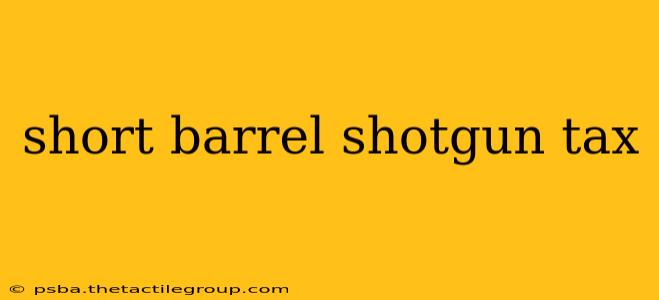The short barrel shotgun (SBS) tax is a significant consideration for anyone interested in owning these firearms. This stems from the National Firearms Act (NFA) of 1934, a piece of legislation designed to regulate certain types of weapons deemed more dangerous or easily concealable. Understanding the NFA's regulations and the associated taxes is crucial before purchasing or possessing an SBS.
What Constitutes a Short Barrel Shotgun Under the NFA?
The NFA defines a short-barrel shotgun as a shotgun having a barrel or barrels less than 18 inches in length. This is a key distinction; a shotgun with a barrel longer than 18 inches is not subject to the same regulations. The overall length of the firearm is also important; it cannot be less than 26 inches from the end of the buttstock to the muzzle. These precise measurements are critical, and any deviation places the firearm under the strict controls of the NFA.
The Tax Stamp and Registration Process
Owning an SBS legally necessitates navigating the complexities of the NFA. This involves:
- Application: Submitting ATF Form 1 to the Bureau of Alcohol, Tobacco, Firearms and Explosives (ATF). This form requires detailed information about the applicant, including fingerprints and photographs.
- Tax Payment: Paying a substantial tax, currently set at $200, for each SBS registered. This is a one-time tax payable upon approval of the application.
- Background Check: Undergoing a thorough background check to ensure eligibility for firearm ownership. This process can take several months.
- Registration: Upon successful completion of the background check and tax payment, the SBS is registered with the ATF, receiving a tax stamp. This stamp must be affixed to the firearm.
Failing to comply with these procedures results in serious legal consequences, including substantial fines and imprisonment.
Legal Implications and Considerations
The legal landscape surrounding SBS ownership is intricate. The NFA imposes strict limitations not only on the manufacturing and sale of these firearms but also on their possession and transfer. These include:
- State Laws: It's crucial to understand that federal regulations are supplemented by state laws, which may impose additional restrictions or outright prohibitions on SBS ownership.
- Transfer of Ownership: Transferring an SBS requires navigating another layer of ATF regulations, including a new application and tax stamp for the new owner.
- Travel Restrictions: Traveling with an SBS across state lines requires additional considerations and adherence to specific regulations.
Alternatives to SBS Ownership
For individuals seeking similar functionality to an SBS without the complexities and legal hurdles, alternatives include:
- Standard Length Shotguns: These offer the versatility and stopping power of a shotgun without the regulatory burdens.
- Other Firearm Types: Depending on the intended use, other firearm types may provide a suitable alternative.
Conclusion
The short barrel shotgun tax is a significant factor in the legal ownership of these firearms. The process of registration and compliance with the NFA is demanding and requires careful attention to detail. Before considering SBS ownership, prospective buyers should fully research and understand all applicable federal and state laws, consult with legal counsel specializing in firearms regulations, and weigh the legal complexities against their needs and preferences. Ignoring these legal requirements carries serious penalties. Understanding the process and its implications is key to responsible and legal firearm ownership.

